
As Israeli Prime Minister Benjamin Netanyahu rejects growing domestic and international calls to accept a Gaza ceasefire deal, we go to Jerusalem to speak to Gershon Baskin of the human rights advocacy group International Communities Organization. Baskin has spent years as a back-channel Israeli negotiator with Hamas in ceasefire deals, including throughout Israel’s current war on Gaza. “It’s very clear that Netanyahu doesn’t want to end the war,” says Baskin, who calls for all remaining stakeholders, including Hamas, the United States and Israeli protesters, to increase pressure on the defiant prime minister.
Transcript
AMY GOODMAN: This is Democracy Now!, democracynow.org, The War and Peace Report. I’m Amy Goodman.
Tens of thousands of Israelis have protested across Israel for the fourth day in a row to demand Prime Minister Benjamin Netanyahu agree to a Gaza ceasefire and hostage release deal. Today, families of Israeli hostages protested outside the Likud party headquarters in Tel Aviv. This followed a Tuesday evening protest outside the Israeli army headquarters.
Despite the mounting pressure, Netanyahu remains defiant, refusing to accept a ceasefire deal, while putting forward new demands and insisting he would not agree to any deal with Hamas unless Israel maintains control of the Philadelphi Corridor along Gaza’s border with Egypt.
President Biden has called on the Israeli leader to do more to secure an agreement with Hamas following the recovery of the bodies of six dead hostages. On Tuesday, U.S. State Department spokesperson Matt Miller addressed the ceasefire negotiations.
MATTHEW MILLER: Over the coming days, the United States will continue to engage with our partners in the region to push for a final agreement. During talks last week, we made progress on dealing with the obstacles that remain, but, ultimately, finalizing an agreement will require both sides to show flexibility. It will require that both sides look for reasons to get to yes, rather than reasons to say no.
AMY GOODMAN: This comes as the Middle East Eye is reporting an anonymous Turkish Foreign Ministry official is accusing the United States of misleading the public by claiming that the Gaza ceasefire negotiations are progressing favorably, and that Washington is not exerting enough pressure on Israel.
We go now to Jerusalem, where we’re joined by Gershon Baskin, Middle East director of International Communities Organization, a human rights advocacy group. For years, he has been a back-channel Israeli negotiator with Hamas in ceasefire deals, including during Israel’s current war on Gaza; in 2011, when he helped negotiate the release of Israeli soldier Gilad Shalit from Hamas captivity in exchange for more than 1,000 Palestinian prisoners. On Tuesday, Baskin shared a deal Hamas leaders told him they would accept and that would lead to the release of all remaining Israeli hostages. He recently wrote, quote, “Let it be clear that Netanyahu has sentenced the hostages to death. Netanyahu stated that Israel will not leave the Philadelphia corridor … meaning that Israel will occupy Gaza for many more years. … Netanyahu is sacrificing the hostages on an altar of his own personal political survival.”
Gershon Baskin, welcome back to Democracy Now! Why don’t you lay out the situation as you understand it at this point and talk about the protests in the streets, what they’re demanding of Netanyahu and why he’s refusing?
GERSHON BASKIN: Right. I think it’s important to point out that, Amy, it isn’t tens of thousands of Israelis who have gone out to the street, it’s hundreds of thousands. To make that equivalent in the United States, it would be like 25 million Americans taking to the streets. That’s the dimension of the protests that we’ve seen in the last days since the bodies of those six hostages were recovered.
We could get many more Israelis on the street if they believe that the Hamas was really willing to release all the hostages, which is why I’ve pleaded with the Hamas to say yes not only to me, but to tell the Egyptians and the Qataris that they agree to the deal that I proposed to them, which is a three-week, end-of-war, full-term ceasefire, Israeli withdrawal from Gaza, release of all the Israeli hostages and a release of an agreed number and list of Palestinian prisoners from Israeli jails. This is a deal that can be made. It is a million times better than the deal that the United States, Qatar and Egypt have been trying to negotiate, unsuccessfully, for the last three months, which would just keep the war going and only release 32 hostages in 42 days. That’s a bad deal. We need to have a good deal put on the table. I’ve communicated this to the White House, to the Qataris, to the Egyptians and, of course, to the Israeli government. Now the officials need to push this through.
AMY GOODMAN: Why is Netanyahu refusing?
GERSHON BASKIN: Well, it’s very clear that Netanyahu doesn’t want to end the war, as one of his top negotiators told me on Saturday. The problem with any agreement that we can put forward is that the bottom line is that Hamas won’t make an agreement that doesn’t end the war, and Netanyahu won’t agree to any agreement that ends the war. He wants to keep this going. He certainly won’t consider ending the war until they find and kill Yahya Sinwar, the Hamas leader in Gaza. But I think that the message of this past weekend was that there’s no reason to believe that any hostage will survive if Israel in fact does find and kill Yahya Sinwar. There’s no reason to believe that they won’t simply execute all the remaining hostages.
AMY GOODMAN: Can you talk about the state of the negotiations since — well, it’s widely believed that it was Israel who assassinated Ismail Haniyeh, the lead negotiator, on Inauguration Day of the new president in Iran. The significance of this?
GERSHON BASKIN: I’m not sure that it had a real impact on the negotiations. Haniyeh was the face of the negotiators from Hamas with the Qatari prime minister, but he wasn’t actually a member of the negotiating team. He wasn’t in the room when negotiations were taking place. Of course, he was the leader of the Hamas politburo and played a significant role there. There are debates of whether or not he was pushing for an agreement or pushing against an agreement. It doesn’t really matter at this time. He’s no longer there, and there are other leaders of Hamas right now. Hamas makes decisions generally in consultation, and they try to reach consensus. When there is consensus or when there is a decision, it’s announced by the Hamas leader in Beirut, Osama Hamdan. And when Osama Hamdan says something in a press conference or on his Telegram page, it’s official, and everyone in Hamas stands behind it.
That’s what we’re waiting for now — that what I’m waiting for now, to Hamas to say that we agree to a three-week deal that will end the war, will release the hostages and release Palestinian prisoners. Of course, increase humanitarian aid into Gaza in a really substantial way, that has to be part of the agreement, as well. But we really need Hamas to signal to the Israeli public that this kind of deal is on the table, so that we can mass the public in the numbers way above a million people on the streets to force Netanyahu to accept it.
AMY GOODMAN: It keeps being said that he wants to keep Israeli soldiers in the Philadelphi Corridor. I spoke to Gideon Levy yesterday, on the editorial board of the Israeli newspaper Haaretz, and he said it’s not even worth talking about this. No one even knew what this was months ago. Suddenly, it has become so key. What is your assessment of what Netanyahu wants there and why this has become important?
GERSHON BASKIN: Look, last night on one of the main Israeli television stations, Alon Ben-David, a very significant military correspondent, said that in all the past months that the Israelis are searching for tunnels that lead underneath the Philadelphi Corridor, the borderline, 14-kilometer borderline between the Gaza Strip and Egypt, they haven’t found a single tunnel that penetrates the border. We have to recognize that this is an international border. There is a sovereign Egyptian side of the border. The Egyptians are responsible for sealing that border. And I’m certain that with the request from the United States and Israel, the Egyptians would agree to American finance and technology know-how and American supervision or observers on the ground to ensure that the border is closed.
This is a made-up issue by Netanyahu to create a new — I don’t know what we want to call it — a new excuse for Israel to remain in Gaza. Essentially, at the end of the day, what it means is that Israeli soldiers would be sitting ducks along the line of this border, where insurgents from Hamas would be able to kill them. And that’s what we’re facing today. Hamas has been largely decimated in terms of its military power, but they have the ability to engage in armed insurgency and kill Israeli soldiers every single day, Hamas fighters popping out of a tunnel and shooting an RPG at an Israeli tank or an Israeli vehicle. And we should be reminded of 18 years of Israel sitting in southern Lebanon, when soldiers came home every week dead, as well. That should be a lesson for us.
AMY GOODMAN: Can you talk about what happened back when you were involved with the negotiation to release the Israeli soldier Gilad Shalit for a thousand Palestinian prisoners? And do you take any lessons from then to what’s happening today?
GERSHON BASKIN: It’s a very different situation when we’re talking about over a hundred hostages and an active war that’s been fought for 11 months with the total destruction of Gaza and 40,000 to 50,000 Palestinians killed and 1,700 Israelis killed, or more than that, so far. So it’s really different.
But there are some lessons. One is that there’s no replacement to a direct, secret back channel with direct communication between the parties. Even if it’s not an official channel, it’s a way to deliver messages and to brainstorm and find new ideas. There is no doubt that negotiating through third-party mediators, like Qatar and the United States and Egypt, convolutes the situation, makes it much more complex, and each side has its own interest here. There’s great reluctance to make compromises.
What I’ve seen, what I’ve observed over the last 18 years that I’ve been doing these negotiations is that sometimes it’s just unbelievable, the kind of behavior of the people in charge of these negotiations, who sometimes seem to be as if they were in a kindergarten classroom, with bringing up issues and ways of talking to each other, or talking at each other, that resemble what young children would do, rather than being responsible and finding direct ways to resolve the problem, which is ending the war and getting the hostages home. They never deal with it directly. And this is the truth today as it was many years ago when Gilad Shalit was in captivity.
AMY GOODMAN: What do you think it would take at this point, in this last minute we have, Gershon?
GERSHON BASKIN: I think it would take an Hamas acknowledgment that they’re ready to release all the hostages, so that we can mobilize the Israeli streets. And it will take extreme American pressure on Netanyahu to make a deal. And the Americans have the pressure, if they were to choose to use it.
AMY GOODMAN: And what would that look like, the U.S. putting pressure on Israel?
GERSHON BASKIN: Well, look, the most obvious are the two things that are the most powerful. One is the shipment of arms to Israel, which is unlikely to happen. The other is the use of the veto in the Security Council and in other international arena. But the American-Israel relationship is so deep and so wide that there are many ways that the United States can use soft power with Israel to get the message across.
And what’s important is that it’s not done just to Prime Minister Netanyahu, but that the Israeli public knows what the United States of America wants and what it’s demanding from Israel. Again, we are still a democracy, or what’s left of a democracy, and the people are the sovereign. And we can mobilize the people if we have the tools to do that.
AMY GOODMAN: Biden, what is the single most important thing he can do as president of the United States?
GERSHON BASKIN: To put a deal on the table which is a good deal, the kind of deal I talked about, and to let the Israeli public know that it’s there. The United States is backing it. Qatar is backing it. Egypt and Hamas will support it. That’s the most important thing that Biden could do right now.
AMY GOODMAN: Gershon Baskin, I want to thank you for being with us, Middle East director of the International Communities Organization, longtime back-channel negotiator with Hamas. His memoir is titled In Pursuit of Peace in Israel and Palestine.
When we come back, Dynamite Nashville. Back in 20 seconds.
[break]
AMY GOODMAN: “Hold On, I’m Comin’,” Sam & Dave, written by Isaac Hayes. A Georgia judge has agreed with a lawsuit by the Hayes family that said the legendary singer would disapprove of Donald Trump’s campaign’s use of his song and ordered the campaign to stop playing it at rallies — the Trump campaign, that is.

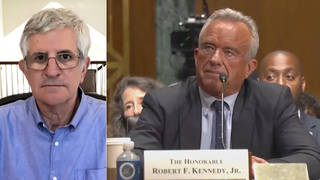
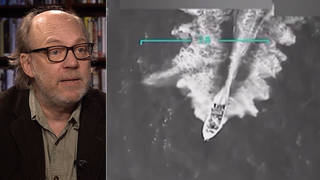
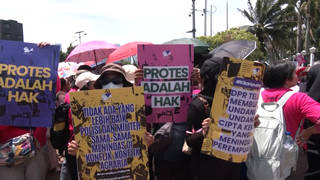






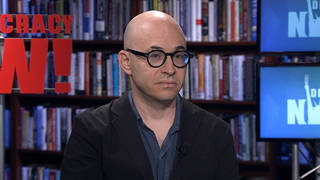
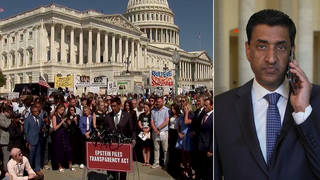
Media Options